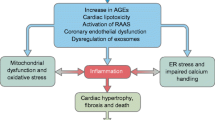Abstract
Patients with diabetes mellitus frequently manifest clinical evidence of cardiac disease, primarily in association with abnormalities of the coronary arteries [1]. Recently, evidence has also been provided supporting the existence of a specific “diabetic cardiomyopathy” in the absence of angiographic signs of coronary artery disease [2, 3]. The pathogenesis and the clinical implications of this abnormality remain, however, poorly understood [4]. A metabolic basis for the diabetic cardiomyopathy has been recently hypothesized [4, 5]. This interpretation stems from the observation that an excessive utilization of ketone bodies by the diabetic heart may lead to acetyl-CoA accumulation with a consequent slowing down of the Krebs cycle [4]. This would inevitably result in a reduced synthesis of ATP which may be the basis for cardiac disfunction. This picture has been drawn from experimental evidence obtained in the perfused heart or in streptozotocin diabetic animals [4]. Thus, the question arises whether the same sequence of events described in vitro may be operative in the human diabetic heart. There is no plausible answer to this question as the necessary information regarding the myocardial exchange of the key metabolic substrates in diabetic patients is not available. Such data would be useful to improve our basic knowledge of heart metabolism in diabetes. Also, they could be of potential importance as to the question whether a metabolic alteration of the myocardium exists which may help explain in the propensity of diabetics to develop cardiac disfunction even in the absence of clinical evidence of coronary artery disease.
This study was, therefore, performed in a group of insulin-dependent, type I diabetics with angiographically intact coronary vessels. The myocardial exchange of the major metabolic substrates was quantitated (arterial-coronary sinus difference × myocardial blood flow) at rest and after atrial pacing, and compared with data obtained in a group of control subjects.
The data indicate a greater utilization of ketones and a reduced oxidation of lactate in the diabetic heart. These abnormalities occur in spite of intact coronary arteries. Thus, the data are compatible with the hypothesis of a metabolic basis for the cardiac disfunction in diabetes.
Access this chapter
Tax calculation will be finalised at checkout
Purchases are for personal use only
Similar content being viewed by others
References
Williams et al. In: Heart disease, a textbook of cardiovascular medicine. Philadelphia, W. B. Saunders, pp 1825–1853
Kannel et al. (1974) The Framinham study. Am J Cardiol 34: 29–34
Shapiro et al. (1981) Br Heart J 45: 129–132
Taegtmejer et al. (1985) Lancet 1: 139–141
Regan et al. (1977) J Clin Invest 60: 885–899
Author information
Authors and Affiliations
Editor information
Editors and Affiliations
Rights and permissions
Copyright information
© 1987 J. F. Bergmann Verlag, München
About this paper
Cite this paper
Crepaldi, G. (1987). Diabetic Cardiomyopathy. In: Miehlke, K. (eds) Kongreß. Verhandlungen der Deutschen Gesellschaft für Innere Medizin, vol 93. J.F. Bergmann-Verlag. https://doi.org/10.1007/978-3-642-85460-6_106
Download citation
DOI: https://doi.org/10.1007/978-3-642-85460-6_106
Publisher Name: J.F. Bergmann-Verlag
Print ISBN: 978-3-8070-0364-1
Online ISBN: 978-3-642-85460-6
eBook Packages: Springer Book Archive




